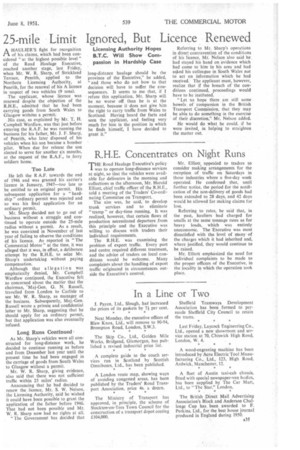25-mile Limit Ignored, But Licence Renewed
Page 53

If you've noticed an error in this article please click here to report it so we can fix it.
A HAULIER'S fight for recognition 1-'1 of his claims, which had been considered "at the highest possible level" of the Road Haulage Executive, reached another stage, last Friday, when Mr. W. R. Sharp, of Strickland Terrace, Penrith, applied to the Northern Licensing Authority, at Penrith, for the renewal of his A licence in respect of two vehicles (9 tons).
The applicant, whose licence was renewed despite the objection of the R.H.E., admitted that he had been carrying goods from South Wales to Glasgow withemt a permit.
His case, as explained by Mr. T. H. Campbell Wardlaw, was that just before entering the R.A.F. he was running the business for his father, Mr. J. F. Sharp, of Penrith, who later disposed of his vehicles when his son became a bomber pilot. When due for release the son elected to serve for another six months, at the request of the R.A.F., to ferry soldiers home.
Too Late
He left the R A.F. towards the end of 1946 and was granted his carrier's licence in January, 1947—too late to be entitled to an original permit. His subsequent application for a "hardship " ordinary permit was rejected and so was his final application for an ordinary permit, Mr. Sharp decided not to go out of business without a struggle and continued to operate outside the 25-mile radius without a permit. As a result, he was convicted in November of last year of failing to observe the conditions of his licence. As reported in "The Commercial Motor" at the time, it was alleged that it was, in effect, a deliberate attempt by the R.H.E. to seize Mr. Sharp's undertaking without paying compensation.
Although that a 1 le ga ti on was emphatically denied, Mr. Campbell Wardlaw continued, the Executive felt so concerned about the matter that the chairman, 'Maj-Gen. G. N. Russell, travelled from London to Carlisle to see Mr. W. R. Sharp, as manager of the business. Subsequently, Maj.-Gen. Russell wrote a private and confidential letter to Mr. Sharp, suggesting that he should apply for an ordinary permit, but that application was also eventually refused.
Long Runs Continued •
As Mr. Sharp's vehicles were all constructed for long-distance work, he decided to continue running as before and from December last year until the present time he had been engaged in the carriage of goods from South Wales to Glasgow without a permit.
Mr. W. R. Sharp, giving evidence, also said that there was not sufficient traffic within 25 miles' radius.
Announcing that he had decided to renew the licence, Mr. S. W. Nelson, the Licensing Authority, said he wished it could have been possible to grant the application of the father before 1946. That had not been possible and Mr. W. R. Sharp now had no rights at all.
"The Government has decided that long-distance haulage should be the province of the Executive," he added, "and those who do not bow to that decision will have to suffer the consequences. It seems to me that, if I ' refuse this application. Mr. Sharp will be no worse off than he is at the moment, because it does not give him the right to carry traffic from Wales to Scotland. Having heard the facts and seen the applicant, and feeling very much for him in the position in which he finds himself, I have decided to grant it." Referring to Mr. Sharp's operations in direct contravention of the conditions of his licence, Mr. Nelson also said he had stayed his hand on evidence which had come to him in his area and had as)ced his colleague in South Wales not to act on information which he had received. The applicant must, however, realize that if the breach of the conditions continued, proceedings would have to be instituted, " Let us hope there are still some bowels of compassion in the British Transport Commission, that they may be able to do something in the exercise of their discretion," Mr. Nelson added.
He would do what he could, if he were invited, in helping to straighten the matter out.




















































































